新概念第二册第课课文讲解
新概念英语第二册Lesson22Aglassenvelope课文讲义
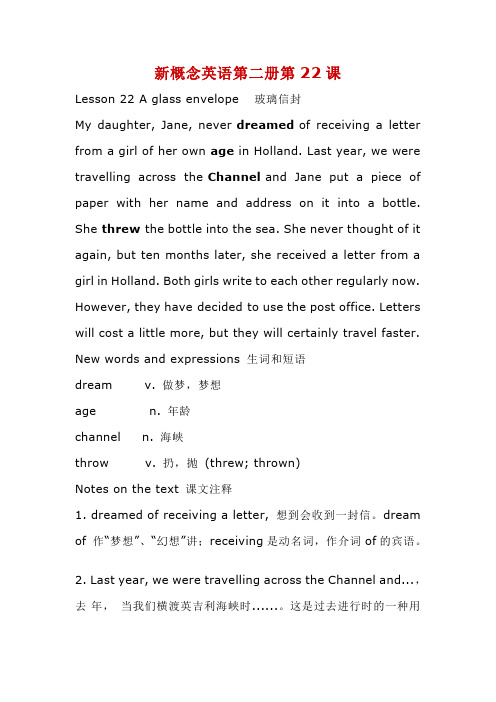
新概念英语第二册第22课Lesson 22 A glass envelope 玻璃信封My daughter, Jane, never dreamed of receiving a letter from a girl of her own age in Holland. Last year, we were travelling across the Channel and Jane put a piece of paper with her name and address on it into a bottle. She threw the bottle into the sea. She never thought of it again, but ten months later, she received a letter from a girl in Holland. Both girls write to each other regularly now. However, they have decided to use the post office. Letters will cost a little more, but they will certainly travel faster. New words and expressions 生词和短语dream v. 做梦,梦想age n. 年龄channel n. 海峡throw v. 扔,抛(threw; thrown)Notes on the text 课文注释1. dreamed of receiving a letter, 想到会收到一封信。
dream of 作“梦想”、“幻想”讲;receiving是动名词,作介词of的宾语。
2. Last year, we were travelling across the Channel and...,去年,当我们横渡英吉利海峡时......。
新概念英语第二册第一课课文讲解
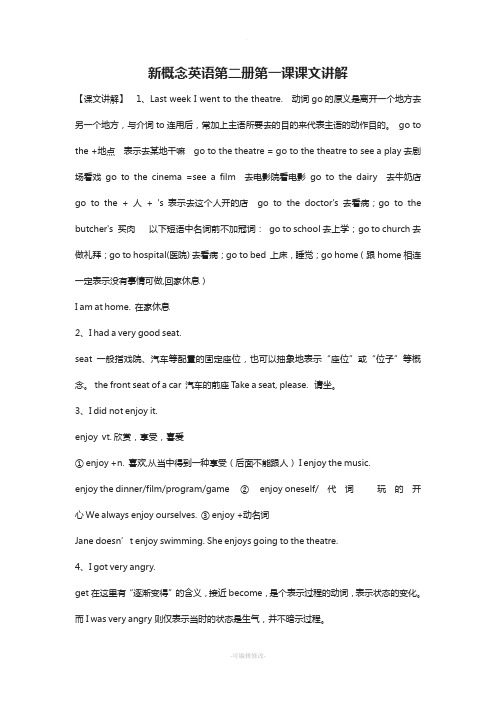
新概念英语第二册第一课课文讲解【课文讲解】1、Last week I went to the theatre. 动词go的原义是离开一个地方去另一个地方,与介词to连用后,常加上主语所要去的目的来代表主语的动作目的。
go to the +地点表示去某地干嘛go to the theatre = go to the theatre to see a play去剧场看戏go to the cinema =see a film 去电影院看电影go to the dairy 去牛奶店go to the + 人+ 's 表示去这个人开的店go to the doctor's 去看病;go to the butcher's 买肉以下短语中名词前不加冠词:go to school去上学;go to church去做礼拜;go to hospital(医院)去看病;go to bed上床,睡觉;go home(跟home相连一定表示没有事情可做,回家休息)I am at home.在家休息2、I had a very good seat.seat一般指戏院、汽车等配置的固定座位,也可以抽象地表示“座位”或“位子”等概念。
the front seat of a car汽车的前座T ake a seat,please.请坐。
3、I did not enjoy it.enjoy vt.欣赏,享受,喜爱①enjoy+n.喜欢,从当中得到一种享受(后面不能跟人)I enjoy the music.enjoy the dinner/film/program/game②enjoy oneself/代词玩的开心We always enjoy ourselves.③enjoy+动名词Jane doesn’t enjoy swimming.She enjoys going to the theatre.4、I got very angry.get在这里有“逐渐变得”的含义,接近become,是个表示过程的动词,表示状态的变化。
新概念英语第二册Lesson+86+Out+of+control+课文讲解讲义

新概念英语第二册第86课Lesson 86 Out of control 失控As the man tried to swing the speedboat round, the steering wheel came away in his hands. He waved desperately to his companion, who had been water skiing for the last fifteen minutes. Both men had hardly had time to realize what was happening when they were thrown violently into the sea. The speedboat had struck a buoy, but it continued to move very quickly across the water. Both men had just begun to swim towards the shore, when they noticed with dismay that the speedboat was moving in a circle. It now came straight towards them at tremendous speed. In less than a minute, it roared past them only a few feet away. After it had passed, they swam on as quickly as they could because they knew that the boat would soon return. They had just had enough time to swim out of danger when the boat again completed a circle. On this occasion, however, it had slowed down considerably. The petrol had nearly all been used up. Before long, the noise dropped completely and the boat began to drift gently across the water.New words and expressions 生词和短语swing v. 转向speedboat n.快艇desperately adv. 绝望地companion n. 同伙,伙伴water ski (快艇牵引水橇)滑水buoy n.浮标dismay n. 沮丧tremendous adj. 巨大的petrol n.汽油drift v.漂动,漂流gently adv.缓慢地,轻轻地参考译文当那人试图让快艇转弯时,方向盘脱手了。
新概念第二册第2课课件

Breakfast or lunch?
单词学习
• • • • • until outside ring(rang, rung) aunt repeat prep. 直到 adv. 外面 v. (铃、电话等)响 n. 姑,姨,婶,舅母 v. 重复
• ★until prep.直到 • until用于表示动作、状态等的持续,可译为“一 直到……为止”或“在……以前”。 • 在肯定句中,它与表示持续性状态的动词连用, 表示某动作持续到某一时刻: • 我会在这里等到5点钟。 • I’ll wait here until 5. • 直到他回来为止,他爸爸都是活着的. • His father was alive until he came back. • 在否定句中,它通常与描述短暂动作的动词连用, 表示“到……为止”、“直到……才”: • 她到6点才能来。 • She cannot arrive until 6. • 直到他回来,他爸爸才死. • His father didn't die until he came back.
• It was Sunday. • it指时间、天气、温度或距离,被称为“虚主 语”。 • 作为第三人称单数的中性代词,it可以指一件 东西、一件事件或用来指是什么人: • 从公司到我家大概有5公里。 • It is about 5 kilometer from the company to my home. • 这是个可爱的小婴儿。 • It is a lovely baby.
• Just then, the telephone rang. It was my aunt Lucy. • just then: 就在那时 • 如果不知道对方性别, 他/她可以用it取代 • 这是谁? • Who is it ?
裕兴新概念英语第二册笔记_第2课_课文讲解
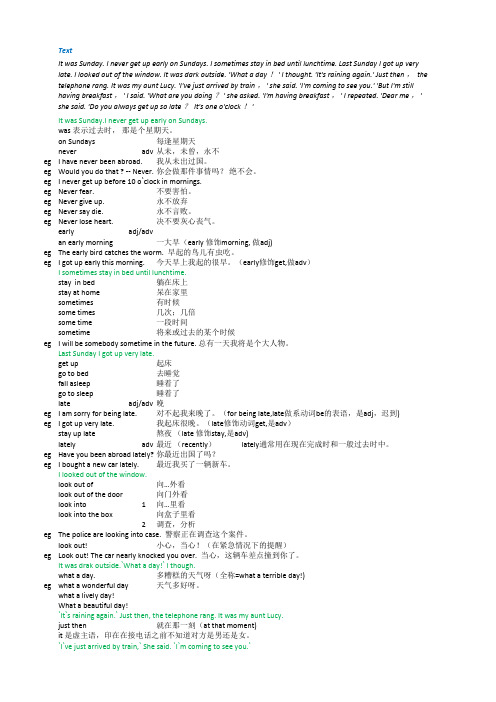
TextIt was Sunday. I never get up early on Sundays. I sometimes stay in bed until lunchtime. Last Sunday I got up very late. I looked out of the window. It was dark outside. 'What a day!' I thought. 'It's raining again.' Just then, the telephone rang. It was my aunt Lucy. 'I've just arrived by train,' she said. 'I'm coming to see you.' 'But I'm still having breakfast,' I said. 'What are you doing?' she asked. 'I'm having breakfast,' I repeated. 'Dear me,' she said. 'Do you always get up so late? It's one o'clock!'It was Sunday.I never get up early on Sundays.was 表示过去时,那是个星期天。
on Sundays每逢星期天never adv从未,未曾,永不eg I have never been abroad.我从未出过国。
eg Would you do that ? -- Never.你会做那件事情吗?绝不会。
eg I never get up before 10 o`clock in mornings.eg Never fear.不要害怕。
新概念英语第二册第一课最全讲义
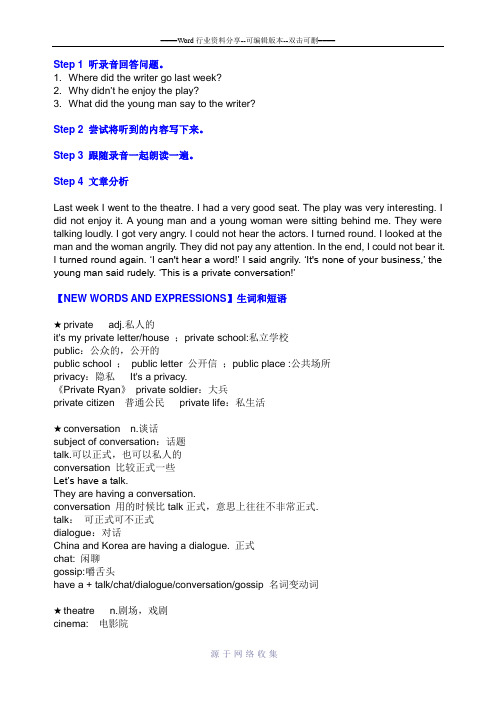
Step 1 听录音回答问题。
1. Where did the writer go last week?2. Why didn’t he enjoy the play?3. What did the young man say to the writer?Step 2 尝试将听到的内容写下来。
Step 3 跟随录音一起朗读一遍。
Step 4 文章分析Last week I went to the theatre. I had a very good seat. The play was very interesting. I did not enjoy it. A young man and a young woman were sitting behind me. They were talking loudly. I got very angry. I could not hear the actors. I turned round. I looked at the man and the woman angrily. They did not pay any attention. In the end, I could not bear it.I turned round again. ‘I can't hear a word!’ I said angrily. ‘It's none of your business,’ the young man said rudely. ‘This is a private conversation!’【NEW WORDS AND EXPRESSIONS】生词和短语★private adj.私人的it's my private letter/house ;private school:私立学校public:公众的,公开的public school ;public letter 公开信;public place :公共场所privacy:隐私It's a privacy.《Private Ryan》private soldier:大兵private citizen 普通公民private life:私生活★conversation n.谈话subject of conversation:话题talk.可以正式,也可以私人的conversation 比较正式一些Let’s have a talk.They are having a conversation.conversation 用的时候比talk正式,意思上往往不非常正式.talk:可正式可不正式dialogue:对话China and Korea are having a dialogue. 正式chat: 闲聊gossip:嚼舌头have a + talk/chat/dialogue/conversation/gossip 名词变动词★theatre n.剧场,戏剧cinema: 电影院★seat n.座位have a good seat(place)take a seat : 座下来,就座take your seat/take a seatIs the seat taken? 这个座位有人吗?no/yessit Sit down ,pleaseseat Take your seat, please.Be seated, please 更为礼貌seat是及物动词,后面有宾语sit是不及物动词,后面不加宾语seat后面会加人; seat sb; seat him; seat:让某人就座sit he is sitting there.you seat him;〖语法精粹〗When all those present__, he began his lecture.A. sitB. seatC. seatedD. were seatedsit, sit down; seat, be seated; take a seat★play n.戏★loudly adv. 大声的★angry adj. 生气的cross=angry ; I was angry. He was cross.Don't get cross with me, it wasn't my fault.不要对我生气,那不是我的错。
II-01新概念英语第二册,第一课课文讲解,自学导读,练习详解
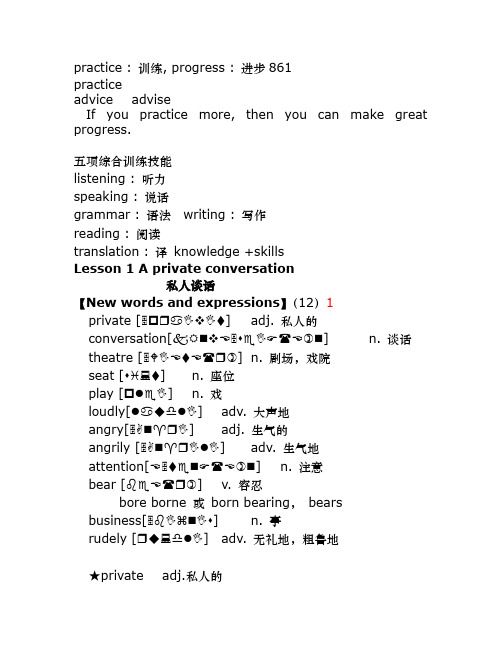
practice : 训练, progress : 进步861practiceadvice adviseIf you practice more, then you can make great progress.五项综合训练技能listening : 听力speaking : 说话grammar : 语法writing : 写作reading : 阅读translation : 译knowledge +skillsLesson 1 A private conversation私人谈话【New words and expressions】(12)1private [ ☐❒♋✋✋♦] adj. 私人的conversation[ ⏹☜♦♏✋☞☎☜✆⏹] n. 谈话theatre [ ✋☜♦☜☎❒✆] n. 剧场,戏院seat [♦♓♦] n. 座位play [☐●♏✋] n. 戏loudly[●♋◆♎●✋] adv. 大声地angry[ ✌⏹♈❒✋] adj. 生气的angrily [ ✌⏹♈❒✋●✋] adv. 生气地attention[☜♦♏⏹☞☎☜✆⏹] n. 注意bear [♌♏☜☎❒✆] v. 容忍bore borne 或born bearing,bearsbusiness[ ♌✋⏹✋♦] n. 事rudely [❒◆♎●✋] adv. 无礼地,粗鲁地★private adj.私人的①adj. 私人的private life 私生活private school 私立学校It's my private letter. (如果妈妈想看你的信)It's my private house. (如果陌生人想进你的房子)②adj. 普通的private citizen 普通公民I‟m a private citizen. (citizen n. 公民)③ n.士兵;二等兵.美国陆军或海军陆战队的非士官军衔,低于一等兵private soldier 大兵《Private Ryan》(《拯救大兵瑞恩》)public adj. 公众的,公开的(private的反义词)public school 公立学校public letter 公开信public place 公共场所privacy n.隐私It‟s privacy. 这是我的隐私!(不愿让别人知道的) Private adj. 1. 个人的,私人的= personale.g. a private care.g. a private garden2. 私营的,私立的e.g. New Oriental School is a private school.反义词:public adj. 公开的,公立的e.g. a public letter; a public placein private 私下里,单独地对应:in public 公开地e.g. She wanted to talk to me in private rather than in public.[script]Rachel: Ross, could I talk to you in private?Ross: Sure, you want to go upstairs?★conversation n.谈话have a + talk/chat/dialogue/conversation/gossip 名词变动词conversation 一般用于正式文体中, 内容上往往不正式subject of conversation 话题They are having a conversation.talk 内容可正式可不正式, 也可以私人Let‟s have a talk.dialogue[ ♎♋♓☜●♈] 对话, 可以指正式国家与国家会谈China and Korea are having a dialogue.chat[♦☞✌♦]闲聊,就是北京人说的“侃”,说的是无关紧要的事。
新概念英语第二册Lesson33课文:Outofthedarkness

新概念频道为⼤家整理的新概念英语第⼆册Lesson 33课⽂:Out of the darkness ,供⼤家参考。
更多阅读请查看本站频道。
【New words and expressions】 darkness n. ⿊暗 explain v. 解释,叙述 coast n. 海岸 storm n. 暴风⾬ towards prep. 向,朝;接近 rock n. 岩⽯,礁⽯ shore n. 海岸 light n. 灯光 ahead adv. 在前⾯ cliff n. 峭壁 struggle v. 挣扎 hospital n. 医院 ★darkness n. ⿊暗 in the darkness 在⿊暗中(在没有光线的情况下) ★explain [] v. 解释, 叙述 explanation [] n. 解释 Could you give me an explanation? 能给我⼀个解释吗? interpret [] v. 解释, (强调翻译)语⾔之间的解释 interpreter [] n. 解释程序,解释者,⼝译⼈员,翻译员,讲解员 interpretation [] n. 解释, 阐明, ⼝译, 通译 interpretress [] n. ⼥翻译员 ★coast n. 海岸(地理意义上的海岸, 海岸线等, 感觉旁边是岩⽯, 很陡峭 seashore n. 海岸(跟游玩有关系, 为了游玩的) seaside n. 海边 seashore/ seaside 给⼈的感觉是旁边是沙滩, 可以进⾏⽇光浴的感觉 bank n. 河岸,坝,堤(两边⽐⽔⾯⾼) ★storm n. 暴风⾬ (只解释为“风暴”) snowstorm n. 暴风雪 thunderstorm [] n. [⽓]雷暴,雷⾬ rain heavily 表⽰⾬下得很⼤ pour [] v. 灌注, 倾泻, 涌⼊, 流, 倾盆⼤⾬ The rain is pouring. 倾盆⼤⾬ It's raining cats and dogs. 滂沱⼤⾬ ★towards prep. 向, 朝, 接近 towards 强调nearer and nearer(强调越来越近) ★rock n. 岩⽯, 礁⽯ rock 表⽰huge stone (huge[] adj 巨⼤的, 极⼤的, ⽆限的) ★ahead adv. 在前⾯ a开头的词(asleep,awake,alive,ahead,alight…)往往是表语形容词。
- 1、下载文档前请自行甄别文档内容的完整性,平台不提供额外的编辑、内容补充、找答案等附加服务。
- 2、"仅部分预览"的文档,不可在线预览部分如存在完整性等问题,可反馈申请退款(可完整预览的文档不适用该条件!)。
- 3、如文档侵犯您的权益,请联系客服反馈,我们会尽快为您处理(人工客服工作时间:9:00-18:30)。
L e s s o n14D o y o u s p e a k E n g l i s h?I had an amusing experience last year. After I had left a small village in the south of France, I drove on to the next town. On the way, a young man waved to me. I stopped and he asked me for a lift. As soon as he had got into the car, I said good morning to him in French and he replied in the same language. Apart from a few words, I do not know any French at all. Neither of us spoke during the journey. I had nearly reached the town, when the young man suddenly said, very slowly, "Do you speak English?' As I soon learnt, he was English himself!'参考译文去年我有过一次有趣的经历。
在离开法国南部的一个小村庄后,我继续驶往下一个城镇。
途中,一个青年人向我招手。
我把车停下,他向我提出要求搭车。
他一上车,我就用法语向他问早上好,他也同样用法语回答我。
除了个别几个单词外,我根本不会法语。
旅途中我们谁也没讲话。
就要到达那个镇时,那青年突然开了口,慢慢地说道:“你会讲英语吗?”我很快了解到,他自己就是个英国人!【New words and expressions】生词和短语★amusing adj. 好笑的,有趣的amused:感到好笑的amuse v.动词后面会加人做宾语The story amused me.The story is amusing.I am amused.interesting:有意思The book is interesting.The book is amusing.funny:好笑的,可以指贬义,开心的,令人开心的interesting/funny story★experience n. 经历经验、体验:不可数名词经历、感受:可数名词He has a lot of experience. He has a lot of experiences.Experience is the best teacher. 经验是最好的老师。
They still lacked experience. 他们经验还不足。
Something about your background and experience. 谈谈你的背景情况和经历。
+s(a/an),经历;原形,经验experienced:有经验的He is an experienced doctor.表示做某事的经验,其后通常不接不定式,而接in [of] doing sth。
He has had much experience in [of] this kind of work. 他有丰富的经验做这项工作。
experiece in [of] teaching=teaching experience(教学经验)experience还可表示“体验”“经历”等,只用作及物动词。
All children will experience fun and excitement in learning and growing up.在学习和成长中的所有儿童都将感受到快乐和兴奋。
The child had never experienced kindness. 这孩子从未受过善待。
词语扩展:experienced作形容词,表示有经验的。
例句:He is an experienced teacher.他是一位经验丰富的老师。
★wave vt. 向…挥手示意;使成波浪形vi. 波动;起伏;挥手示意;摇动;呈波形wave to sb;向某人招手The children waved to their teacher. 孩子们向老师招手。
★lift n. 搭便车vt. 举起;提升I was a lift.take a bus/taxi/lifttake a lift:搭便车I take a list.The student gave me a lift.give sb a lift:让某人搭便车I will give you a lift to the airport.我可以顺便送你去机场。
B wants to take a lift.A will giveB a lift.hitch hiker:搭便车的人lift sb. /sth. up 将某人/某物抬起He lifted the box. 他举起了箱子。
★reply v. 回答answerHe answered/replied.answer sth/reply to sth.answer the letter:回信I will reply to the letter.★language n. 语言native language:母语mother tongueThe native language is Chinese.My mother tongue is Chinese.★journey n. 旅行begin a trip:开始一个旅行begin a journeytrip,travel,tourtrip:短距离旅行或出差go on business/go on a triptravel:周游(长途)tour,为了玩tourist:游客journey:所有的旅行go on a journey, 3 days' journey2 hours' journeyvoyage:旅行(海上)flight:空中飞行journey:偏重于陆地旅行trip;travel;tour;journey;voyage;flight【notes on the text】●I drove on to the next town. 我继续驶往下一个城镇。
句中的副词on 有“继续地”“不停顿的”的意思。
He can work on without a break. 他能不停地工作。
●in the south of表达方位的表达方式一共有3个介词,in,on,to没有相接的,是相离的,to接壤,on在什么里面,in●On the way 在途中,即将发生in the way在路上,在途中挡住去路in a way 在某种程度上in this way 这样by the way顺便提一下,另外by way of通过…方法;经由give way让路,让步;撤退in every way在各方面,以各种方式in no way决不,一点也不in the way of妨碍;在…方面,关于lead the way引路,带路;示范make way让路;开路;进展make one's own way成功,发迹make one's way前进,前往,行进under way在进行中,前进着●as soon as:一...就...户名一定要加一个句子(时间主语从句),后面的先发生As soon as I had received the letter,I ringed/called him back.只要是状语从句,一旦遇到将来时,变为一般现在时As soon as you arrive,you must call me.As soon as 强调两个动作几乎是连在一起的●Ask for a lift 要求搭车搭便车:take a lift给某人搭便车:give sb a lift●Apart from 除了.....之外Except They were all there except me. 除了我以外他们都在那里。
except for含有对整体中的某一个方面不满意Except for his height,he is very excellent.The article is very good except for his handwriting.Besides She has so much else to do besides doing her homework.除了做她的作业外她还有许多其他的事情要做。
in addition to He speaks French in addition to English.他除了说英语之外,还会说法语。
I invited everyone except George. Except for George I invited everyone.Except for/apart from this,everything is in order.●not at all:一点点都不I don't like it. I don't like it at all.●neitherduring the journey:在旅途当中,自始自终neither of sb,either of sbeither of sb:什么当中的任何一个neither of sb:什么当中的任何一个都不either,neither 都是指两个当中的任何一个如果不只两个人,就变成none of●As I soon learnt, he was English himself! 我很快就知道,他自己就是一个英国人。
As+主语+动词+逗号+句子,As:正如As I think,it is the coldest day in the year.As my mother said/As I heardAs he said,English is easy to learn.●himself,反身代词单独放在句尾,起强调作用I read English myself.I stopped=I stopped the car.ask sb for sth:请求某人要求得到什么东西say goodbye,say sorry,say hello,say good morning to him用某种语言:in+某种语言I speak English.I say a word in Chinese.reply 要想加宾语要加toin the smae languageas soon as:一...就...As soon as I had entered the room,I took off my coat at once.【Key structures】过去完成时过去完成时:过去的过去或两个动作都在过去,一个动作在前,一个在后,发生在前的动作为过去完成时过去完成时一定要以一个过去时态在铺垫,这个动作一定要发生在had done之后After he had finished work he went home.The children ran away after they had broken the window.until:直到什么时候为止,直到什么时候才until,在后面一个从句之前发生了主句until,主句和从句两个都用一般过去时对,主句和从句然后一个用过去完成是也对I had not understood the problem until he explained it.after后面会加过去完成时,before后面会加一般过去时【Special difficulties】a.ask and ask forask sth:问什么什么东西,ask a question/ask sbask for sth:要求得到,ask for the answerc.which of ,either of, neither of ,both ofeither of :两者当中的任何一个neither of:两者都不which of :那一个,which of the twoboth of:两者都Which of the two do you like?I want both of them.I want either of them.I want neither of them.【Multiple choice questions】6.I speak a few words of French. I don't know ______French. ...b...A. ManyB. MuchC. Plenty ofD. A littleFrench不可数,不能用manyplenty of:足够多的not much: a littlenot a little: much7.Neither of us spoke. We ______ ...c....A. Neither spoke C. Either spoke C. Both didn't speak D. Neither didn't speakneither不会和not连用either:任何一个both:两个都neither of,不能说we neither,只能说neither of us9.The young man waved the writer. He _____him. ....c....A. SalutedB. GreetedC. Signalled toD. noddedsalute:n. 致敬,欢迎;敬礼Greet vt. 欢迎,迎接;致敬,致意;映入眼帘Signal vt. 用信号通知;标志10.He asked for a lift. He was a _______ ..b...A. TrampB. Hitch hikerC. PassengerD. Foreigner tramp:流浪汉hitch hiker:搭便车的人passenger:乘客,付车钱12.The writer had ______ reached the town when the young man spoke.A. OftenB. AlmostC. SometimesD. Just asalmost=nearlyjust as 正当...时候+时间主语。
